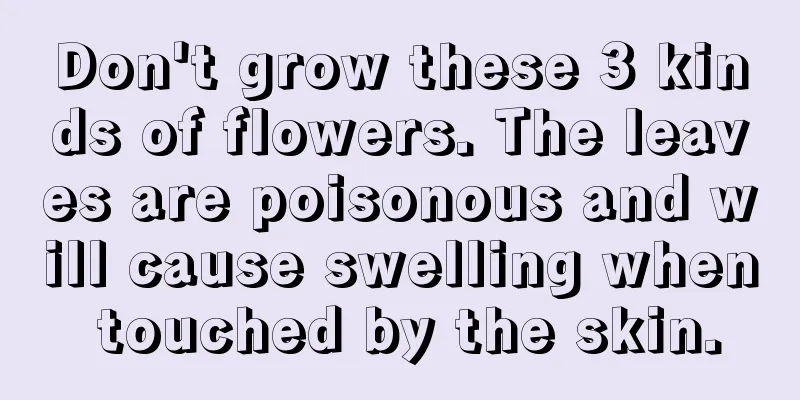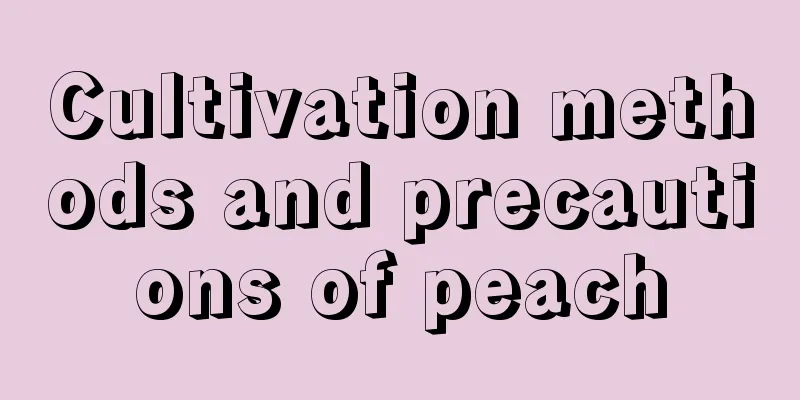Don't grow these 3 kinds of flowers. The leaves are poisonous and will cause swelling when touched by the skin.

|
Huahua discovered that plants like the familiar Christmas cactus and Kalanchoe are really popular among people! In addition, foliage plants such as the money tree and monstera are also very popular among people. Although growing flowers is a good thing, we must be careful when choosing plants, because not all plants look cute, and they may be "smiling but hiding a dagger"! Today Huahua will talk to you about which common plants in our lives are poisonous. In order to ensure everyone’s health, it is best not to grow these plants! The first one: daffodilsWhen it comes to the fact that daffodils are poisonous, many friends may not believe it. It’s not so much that they don’t believe it, but rather that they don’t want to believe it. Who would have thought that daffodils, which look so cute and beautiful, are actually poisonous? The poison of daffodils lies in their flowers. The leaves and juice of the flowers can cause redness, swelling and itching on our skin. It would be bad if a naughty child at home got some on his hands. In addition, if a child at home accidentally eats daffodils, it will cause vomiting and enteritis. It is best to keep an eye on the child. If he or she accidentally eats daffodils, remember to seek medical attention in time. The second type: Dripping GuanyinDon’t be fooled by the name of this weeping angel, which sounds kind and benevolent. Its leaves are actually poisonous. The juice from its leaves can cause redness and swelling on our skin. If the juice from the leaves gets into our eyes accidentally, it may cause blindness! Considering the high toxicity of the Weeping Goddess, it is best not to grow it. If you really want to grow it, Huahua suggests that you keep it outdoors to avoid incidents. The third type: PoinsettiaNot only does the poinsettia look like its name, but touching it will cause a red, swollen patch of skin. This is because the juice of poinsettia leaves is poisonous. The toxicity is very strong and small animals may die if they accidentally ingest it. For the three plants mentioned above, Huahua recommends that friends who have children at home should be cautious when growing them. If the children are naughty and touch them, they will have to go to the hospital for treatment. If there are no children at home, Huahua suggests that it is best to plant these plants in the yard. Apart from watching and watering, it is best not to touch it casually. If you can't help touching it, don't keep it when it is exposed to the sun! |
<<: What to do if your hands are burned by peppers
>>: Why can't you grow red spider lilies?
Recommend
How to cultivate jade ornaments
1. Soil Normally, jade plants particularly like s...
Should ginger lotus be watered thoroughly? How much water should be watered at a time?
Is the ginger lotus watered thoroughly? Ginger lo...
How to grow carrots on the balcony
Carrot seedlings 1. First, water the potting soil...
How to raise Xiaoyu
1. Breeding environment 1. Soil: The requirements...
What fertilizer is best for yellow peel
Fertilization time for yellow peel Huangpi is gen...
Can mulberry trees be planted in the yard?
Can I plant mulberry trees in my yard? The mulber...
What are the cultivation methods and precautions for carnations?
Carnation growth habits Carnations do not like su...
When is the best time to sow asparagus fern
Suitable time for planting asparagus fern Asparag...
How to grow Nandina domestica bonsai and how to grow its roots
1. Breeding methods 1. Soil: It has relatively hi...
Camellia rhododendron cultivation method
1. Breeding methods 1. Soil: Camellia azalea grow...
Which month is suitable for planting cabbage?
Cabbage, also known as kale, white cabbage, and C...
What is the function of Caragana
Ornamental effect Caragana has a certain ornament...
Orchid summer care
1. Summer maintenance tips 1. Watering: When cari...
How to propagate strawberries and what to pay attention to
Strawberry reproduction method There are four way...
Ginseng planting conditions and methods
Ginseng , scientifically known as ground ginseng,...









